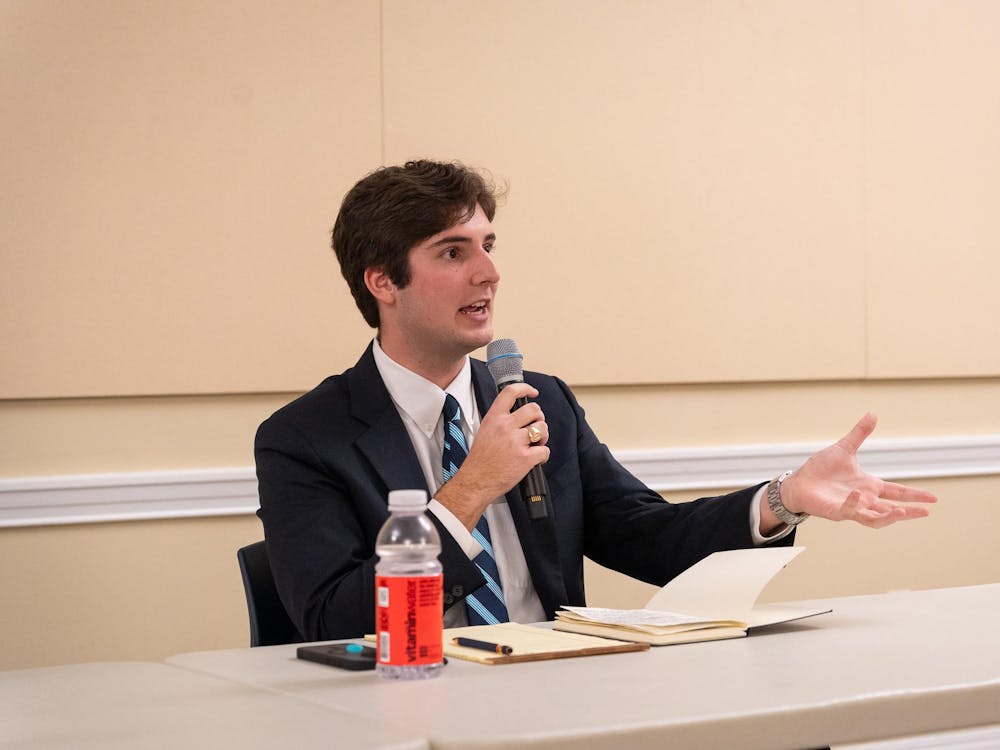The University's Faculty Senate voted unanimously Friday to support the Department of Middle Eastern and South Asian Languages and Culture's proposal to create its first master's degree program. Members also continued to discuss the body's scholarly copyright resolution, which would require publishers to release unedited versions of faculty members' articles.
University officials believe there is sufficient demand from outside the University for a MESALC master's degree program. About 10 students are expected in each class and the new program is not expected to draw many students away from other departments.
MESALC itself is interdisciplinary by nature, so the new master's program will require the department to add only one more course, MESALC Department Chair Dan Lefkowitz said. Other degree requirements to obtain the master's degree can be fulfilled through a wide range of courses, including history, politics and religion courses.
Before it becomes official, the proposed program will be voted on by the University's Board of Visitors and then by the State Council of Higher Education for Virginia.
Though faculty members unanimously supported the MESALC resolution, debate still continued about the scholarly copyright resolution.
If the proposal is adopted, all faculty members would have to ask their publishers to agree to release unmodified versions of their articles to be placed in a public University repository. Faculty members unable or unwilling to do so could e-mail a University official to ask for a waiver.
Though many faculty members support the resolution, there is enough disagreement across departments that the Senate may in fact modify the resolution to reach a stronger consensus among Senate members, Chair Ann Hamric said.
"A simple majority vote would not provide the legitimacy that transformative legislation requires," Task Force Chair Brian Pusser said. "We hope to keep up [the dialogue] and bring another resolution to the Senate."
One common concern among faculty members is that the waiver process will pose another bureaucratic obstacle that could interfere with faculty's ability to pursue teaching and research, Task Force Member Ed Kitch said.
The resolution also highlights the larger issue of allowing open access to scholarly work. Many professors disagree about the extent to which open access should be implemented.
Specifically, History Prof. Allan Megill said he believes that small journals in the humanities should still require readers to pay small fees to download articles to compensate for the journals' publishing costs.
"We do not have people that could pay to subsidize us, not like the [National Institutes of Health and National Science Foundation]," he said. "Forty-two percent of revenue comes from electronic access, so those pennies that are paid ... fund the journal."
While these concerns address all fields and research areas, other concerns have been more discipline-specific.
For example, the physics department already has access to open repositories but has encountered publishers who are reluctant to release article copyrights.
Meanwhile, professors from departments such as art history and architecture - where figures and drawings are often critical to their work - are worried that the repository versions of articles may not be useful, because they may not include graphics or formatting found in journal versions.
Spanish, Italian & Portuguese department members, meanwhile, are skeptical about how the resolution requires that participation be mandatory, though it includes an option to sign a waiver. Some faculty members noted that it would be more useful to simply have a resolution whereby participation is optional.
"Opt-in or opt-out is something we need to talk about," Pusser said. "But the reason we chose opt-out was to build that critical mass [of faculty support], to make it routine."
Pusser said the currently proposed waiver process should easily allow faculty to opt out, and their lack of participation should not endanger any individual publications.
Friday's meeting also included updates from President John T. Casteen III about the University's capital campaign and position in international rankings, as well as the state budget.
Additionally, Casteen discussed how the University may be able to tap into a profitable overseas market, particularly in developing countries such as India, for online graduate degree programs. Unlike many of the degree-granting options on Grounds, however, these potential programs would most likely have to be pre-professional in their focus to suit the tastes of the target markets, he said.






